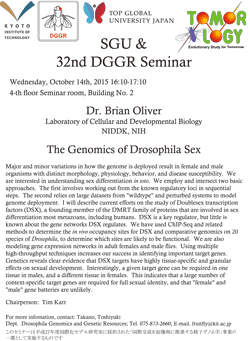Drosophila Genomics and Genetic Resources
Kyoto Institute of Technology
- Department of Drosophila Genomics and Genetic Resources
Center for Advanced Insect Research Promotion
Kyoto Institute of Technology - Saga Ippongi-cho, Ukyo-ku, Kyoto 616-8354, Japan
- Phone: 075-873-2660
- Facsimile: 075-861-0881
DGGR NEWS & EVENTS
- Home
- DGGR News & Events
- SGU & 32nd DGGR Seminar
SGU & 32nd DGGR Seminar
Posted in News English,センター活動,教育・研究 on October 02,2015
| Date | : | Wednesday, October 14th, 2015 |
| Time | : | 16:10-17:10 |
| Location | : | 4-th floor Seminar room, Building No. 2 (Matsugasaki, Sakyo-ku, Kyoto) |
| Speaker | : | Dr. Brian Oliver Laboratory of Cellular and Developmental Biology NIDDK, NIH |
| Title | : | "The Genomics of Drosophila Sex" |
| Abstract | : | Major and minor variations in how the genome is deployed result in female and male organisms with distinct morphology, physiology, behavior, and disease susceptibility. We are interested in understanding sex differentiation in toto. We employ and intersect two basic approaches. The first involves working out from the known regulatory loci in sequential steps. The second relies on large datasets from "wildtype" and perturbed systems to model genome deployment. I will describe current efforts on the study of Doublesex transcription factors (DSX), a founding member of the DMRT family of proteins that are involved in sex differentiation most metazoans, including humans. DSX is a key regulator, but little is known about the gene networks DSX regulates. We have used ChIP-Seq and related methods to determine the in vivo occupancy sites for DSX and comparative genomics on 20 species of Drosophila, to determine which sites are likely to be functional. We are also modeling gene expression networks in adult females and male flies. Using multiple high-throughput techniques increases our success in identifying important target genes. Genetics reveals clear evidence that DSX targets have highly tissue-specific and granular effects on sexual development. Interestingly, a given target gene can be required in one tissue in males, and a different tissue in females. This indicates that a large number of context-specific target genes are required for full sexual identity, and that "female" and "male" gene batteries are unlikely. |
| Chairperson | : | Tim Karr |
For more infomation, contact: Takano, Toshiyuki
Dept. Drosophila Genomics and Genetic Resources
Tel. 075-873-2660
Please contact from this form.

このセミナーは平成27年度国際化モデル研究室に採択された「国際交流を起爆剤に推進する精子ゲノム学」事業の一環として実施するものです